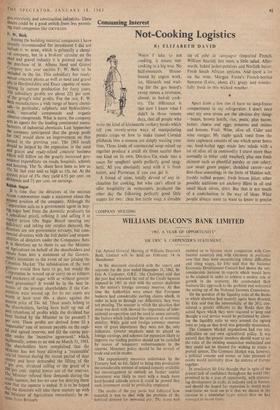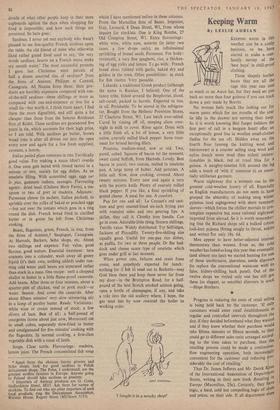Consuming Interest
Not-Cooking Logistics
By ELIZABETH DAVID A friend of mine, totally devoid of any in- clination for cooking, but who can't afford to offer hospitality in restaurants, produced the other day the following perfectly good little supper for two : clear hot turtle soup, a sizeable tin of pate: de cam pagne (imported French, William Saurin), hot toast, a little salad. After- wards, baked jacket-potatoes and Norfolk butter. Fresh South African apricots. And spent a lot on the wine. Morgan Furze's French-bottled Sancerre (Loire, about £1), grapy and wonder- fully fresh in this wicked weather.
Apart froth a few tins (I have no deep-freeze compartment in my refrigerator. I don't need one) my own stores are the obvious dry things —beans, brown lentils, rice, pasta; plus bacon, butter, cheese and eggs; potatoes and onions and lemons. Fruit. Wine, olive oil. Cider and wine vinegar. My staple quick meal from the store cupboard consists of one which never bores me, hard-boiled eggs made into salads with a lot of olive oil (a commodity I crave more than normally in bitter cold weather), phis one fresh element such as plentiful parsley or raw celery, raw sweet green pepper, shredded carrot—and first-class seasonings in the form of Maldon salt, freshly milled pepper, fresh lemon juice; other possible additions are anchovy fillets in oil and small black olives, ditto. But that is not much' of a contribution in the way of ideas. What people always seem to want to know is precise details of what other people keep in their store cupboards against the days when shopping for food Is impossible; and how such things are presented. So here goes: Sardines. I never yet met anybody who wasn't pleased to see fine-quality French sardines upon the table. An old friend of mine who otherwise liked rather grand food used to say, 'the very words sardines, beurre on a French menu make my mouth water.' The most successful presents I gave last Christmas were parcels of half a dozen assorted tins of sardines* from the firms of Amieux, Philippe et Canaud, Cassegrain. All Nantes firms these; their pro- ducts are horribly expensive compared with run- of-the-mill sardines—three shillings or more as compared with one-and-sixpence or less for a small tin—but worth it, I think (taste apart, I find them the more digestible), and still quite a lot cheaper than those from the famous Bordeaux firm of Rode]. These sardines are guaranteed five years in tin, which accounts for their high price, so I am told. With sardines go butter, brown bread (one is after all driven out into the open every now and again for a few fresh supplies), cayenne, a lemon.
Italian peeled plum tomatoes in tins. Terrifically good value. For making a sauce (don't overdo it. One soon gets bored with tinned tastes) in a minute or two, mainly for egg dishes. As an omelette filling. With scrambled eggs, eggs sur le plat, gammon rashers, sausages. Flavouring agents: dried basil (Chiltern Herb Farm), a tea- spoon or two of port or madeira. Adjuncts: Parmesan cheese (in sachets, Italian packed), to sprinkle over the yolks of baked or poached eggs —but not over the tomato which goes in a ring round the dish. French bread fried in clarified butter or in goose fat left from Christmas cooking.
Beans, flageolets, green, French, in tins; from the firms of Amieux,t Saupiquet, Cassegrain. At Harrods, Barkers, Soho shops, etc. About two shillings and sixpence. Fair value, good flavour, good texture. Essential treatment: turn contents into a colander, wash away all gooey liquid (it's their own, nothing added) under run- ning cold water until beans are separated rather than stuck in a mass. One recipe: melt a chopped shallot in butter in a little flame-proof casserole. Add beans. After three or four minutes, about a quarter-pint of chicken, veal or pork stock—or water. Season. And cover the casserole. After about fifteen minutes' very slow simmering stir in a lump of parsley butter. Ready. Variations: white wine or cream instead of stock; a few slivers of ham. Best of all: a half-pound of courgettes (some about just now, Moroccan) cut in small cubes, separately slow-fried in butter and amalgamated for five minutes' cooking with the flageolets. In normal cooking, a first-class vegetable dish with a roast of lamb.
Soups. Clear turtle. Flavourings: madeira, lemon juice. The French concentrated fish soup * Apart from the obvious luxury grocers and Soho shops, look for good sardines in Polish delicatessen shops. The Poles, I understand, are the greatest sardine fanciers in Europe. Anyone going to Poland should take sardines as presents.
t Importers of Amieux products are G. Costa, Staffordshire Street, SE15. Ask them for names of stockists. To find out who are other importers of such food products, ring the Delicatessen Association, Walmar House, Regent Street (MUSeum 5153). which I have mentioned before in these columns. From the Marseilles firm of Basso. Importer, Guy, Leonard, 8 Dean Street, WI, from whom inquire for stockists. One is King Bomba, 27 Old Compton Street, WI. Extra flavourings: white wine, white rum, anisette (in latter two cases, a few drops only), an infinitesimal sprinkling of fennel seeds, Parmesan. For body: vermicelli, a very fine spaghetti, rice, a thicken- ing of egg yolks and lemon. To go with: French bread slices rubbed with garlic, baked dry and golden in the oven. Other possibilities : as stock for fish risotto. Very passable.
Lakerda: a traditional Greek product (although the name is Russian, I believe). One of the tunny tribe, fished around the Bosphorus, sliced, salt-cured; packed in barrels. Exported in tins, in oil. Perishable. To be stored in the refrigera- tor. Bought from the Hellenic Provision Stores, 25 Charlotte Street, WI. Last batch over-salted. Cured by rinsing off oil, steeping slices over- night in milk to cover. Rinse again. Dress with a little fresh oil, a lot of lemon, a very little onion, coarsely milled black pepper. Same treat- ment for brined herring fillets.
Potatoes, medium-sized, new or old. Two, pared, cubed. Squares of bacon (at the moment, sweet cured Suffolk, from Harrods. Lovely. Best bacon in years), two ounces, melted in omelette pan. A large lump of butter. Add potatoes. A little salt. Slow, slow cooking, covered. About twenty minutes. Every now and again a turn with the palette knife. Plenty of coarsely milled black pepper. If you like, a final sprinkling of grated cheese. A meal for one. A comfort.
Pan for one and all: Le Creuset's red cast- iron and grey enamel-lined six-inch frying pan with rounded sides and two pouring lips. A skillet, they call it. Chunky iron handle. Can go in oven. Adorable little thing. Sixteen shillings. Terrific value. Widely distributed. Try Selfridges, Jackson of Piccadilly. Twenty-five-shilling size equally good. Useful for one-pan rice dishes, as paella, for two or three people. Or flat had- dock and cheese sauce type of omelette which goes under grill at last moment.
When power cuts, failures and main fuses come, and somebody expected for lunch: nothing for it bdt t4 send out to Burketts—may God bless them and keep them never far from my door—in the Brompton Road, for a half- pound of the best Scotch smoked salmon going, open a bottle of champagne, if any, and take a tray into the old scullery where, I hope, the gas man has by now restored the boiler to working order.
'1 bought it in a novelty shop!'































 Previous page
Previous page